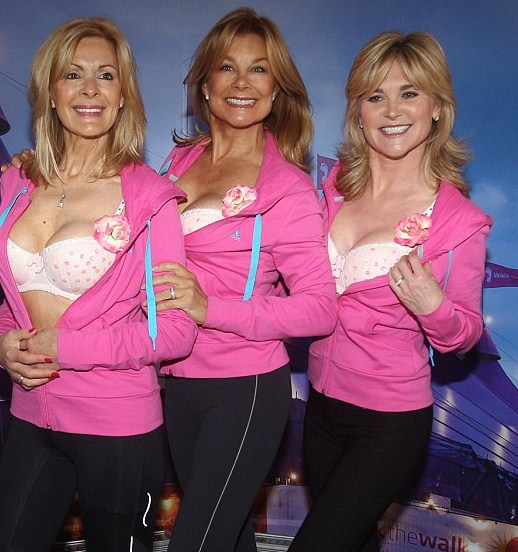Walking the Walk, and Breast Cancer Lies
May 15, 2012

IF WOMEN knew the truth about the causes of breast cancer, would they behave with such silliness and immodesty at breast cancer fundraising events such as the recent Moonwalk in London? Would they be so enthusiastic about supporting the organizations that are, if not lying to them, at least consistently downplaying the truth?
The truth is, feminism causes breast cancer.
Abortion, delayed childbearing, childlessness, lack of breastfeeding, the birth control pill — many medical experts agree these phenomena, all abundantly supported by feminists, are connected to the striking increase in breast cancer in Western women.
Here are some relevant quotes from medical experts provided by the Coalition on Abortion/Breast Cancer, which has a wealth of information on the issue:
Chris Kahlenborn, M.D., author of the book, Breast Cancer: Its Link to Abortion and the Birth Control Pill, wrote that,
“A woman’s breast is especially sensitive to carcinogenic (i.e., cancer producing) influences before she delivers her first child. When a woman becomes pregnant, a number of hormone levels increase dramatically in her body. Three especially notable ones are estradiol, progesterone (i.e. the female sexual hormones), and hCG (human Chorionic Gonadotropin). All of these hormones, especially the latter, serve to stimulate immature breast cells to mature into fully differentiated cells. If this process is artificially interrupted by way of an induced abortion, the hormone levels drop suddenly and dramatically, thereby suspending the natural process of maturation of many of the woman’s breast cells. This is referred to as a ‘hormonal blow’ by researchers. These cells are now ‘vulnerable’ to carcinogens because they started the maturation process but were never able to complete it. (Cells that have fully matured are less vulnerable to carcinogens than cells that are in the process of maturation).” [One More Soul, Dayton, Ohio (2000) p. 21]
Nancy Krieger, Ph.D. published a paper in 1989 in which she acknowledged the importance of an early first full term pregnancy [FFTP]. In the journal Breast Cancer Research and Treatment, she wrote:
“Conversely, early age at FFTP [first full-term pregnancy] consistently has emerged as the strongest protective factor (against breast cancer).”
She explained why early FFTP provides a woman with increased protection against breast cancer and hypothesized that there might be an independent link between the abortion of a first pregnancy and the incidence of the disease. She also said:
“According to this hypothesis, an early first full-term pregnancy would provide the greatest protection against breast cancer by drastically reducing, early on, the presence of undifferentiated and hence vulnerable breast cells, thereby decreasing the risk of subsequent transformation . . . Other types of pregnancies, however, might increase risk of breast cancer. If a woman’s first pregnancy resulted in a first trimester abortion, the dramatic rise in undifferentiated cells that takes place during the first trimester would not be followed by the marked differentiation occurring during the second and third trimesters. The consequent sharp increase in the number of vulnerable cells would thus elevate breast cancer risk. ” [13:205-223]
Susan Love, M.D., a breast surgeon and co-founder of the National Breast Cancer Coalition. Dr. Love offered advice to women in her Breast Book about the importance of an early FFTP. She said, “And the younger you are when you have your first child, the lower your (breast cancer) risk.” (Read our August 21, 2002 press release critical of the gross inaccuracies, omissions and misinformation about the abortion-breast cancer (ABC) research which appears on the National Breast Cancer Coalition’s website). [1995, p. 242]
Dr. Samuel S. Epstein is an internationally recognized expert on the environmental and occupational causes of cancer and an abortion supporter. He is a professor of occupational and environmental medicine at the University of Illinois School of Public Health and founder and chairman of the Cancer Prevention Coalition in Chicago. In his book, The Breast Cancer Prevention Program, he said, “For example, if you were to have an abortion at the age of 25, your risk of developing breast cancer at the age of 60 would increase from 1 in 24 to about 1 in 18, especially if you have more than one abortion before your first full-term pregnancy.” [(1997) pp. 36-37]
— Comments —-
Texanne writes:
In the name of “philanthropy,” supposedly mature women at the Moonwalk, London act out “Girls Gone Wild,” releasing inhibitions for a “good cause.”
Think of the calendar campaigns (I think there’s even a movie) in which older women pose for photos supposedly naked, with strategically placed decorations; celebrities posing naked for PETA to “raise awareness” for their cause; firemen fundraising by posing like the Chippendale stripper ensemble. Evil creeps in on little cat paws, the debasement of human dignity in the guise of noble gesture.
Fred Owens writes:
I tried to be outraged by the photos of Breast Cancer Awareness, but my honest reaction was — Nice Hooters!
Paul writes:
I see undiagnosed prostate cancer cases regularly, and the morbidity rate is equal to breast cancer. Where are the blue ribbons and shoes and hats in sports? Nowhere Man.
Ibitsaam Benzoin writes:
I recently read a magazine article on how vitamin D is powerful in protecting against breast cancer. My immediate thought was, mmm… I don’t think working women who are tied to desks or cash registers get much opportunity to get some sun on their skin. Just another way feminism possibly contributes to breast cancer.
